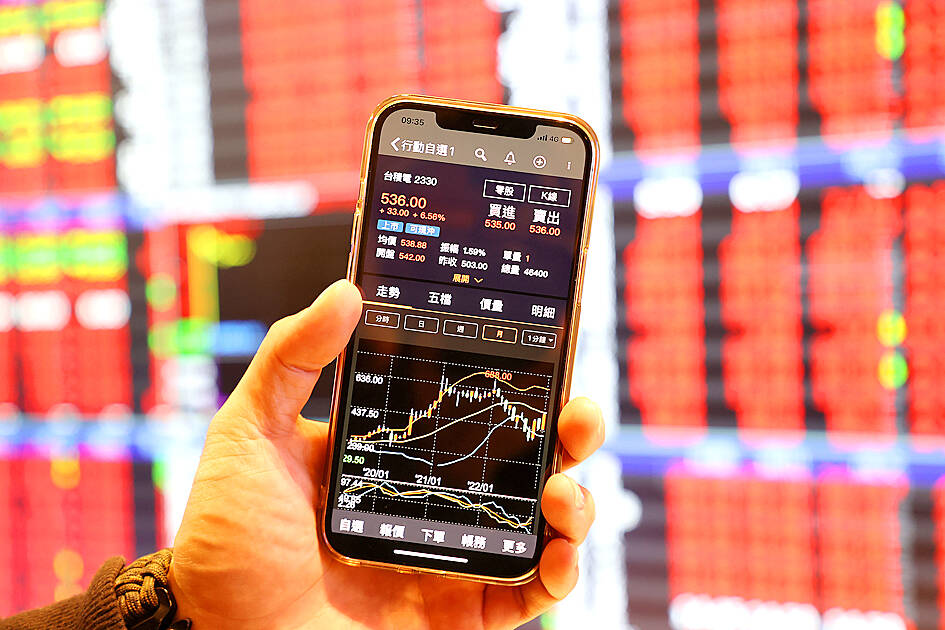Taiwan’s benchmark stock gauge yesterday entered a bull market as trading resumed after the Lunar New Year holiday, with a broad rebound in chip shares boosting foreign buying in the market. The New Taiwan dollar also strengthened against the US currency.
The benchmark TAIEX rose 560.89 points, or 3.76 percent, to 15,493.82, its best day since May 2021, with turnover totaling NT$329.72 billion (US$10.94 billion). That took TAIEX’s gains from an October low to 22 percent, Taiwan Stock Exchange data showed.
Yesterday’s upturn was led by the bellwether electronics sector, especially large semiconductor stocks. Taiwan Semiconductor Manufacturing Co (台積電), the world’s largest contract chipmaker, and MediaTek Inc (聯發科), the nation’s largest handset chip designer, contributed the most to the index’s advance, closing up 7.95 percent and 6.64 percent respectively.

Photo: CNA
Speculation that the US Federal Reserve is nearing the end of its aggressive interest rate hike cycle along with broad optimism in the region due to China’s reopening after easing its strict COVID-19 controls have spurred a comeback for the tech-heavy market after stocks slid for most of last year.
The TAIEX fell 22.4 percent last year.
Big investors including Warren Buffett are also betting that the worst is over for chipmakers amid attractive valuations and easing tensions between China and the US.
Foreign institutional investors yesterday bought a net NT$72.26 billion of local shares on the main board, the highest amount since Dec. 28, 2005, when they recorded a net purchase of NT$125.28 billion, Taiwan Stock Exchange data showed. Foreign funds have snapped up US$4.6 billion in shares year-to-date, Bloomberg-compiled data showed.
Goldman Sachs Group Inc upgraded Taiwan to “market-weight” from “underweight” on Friday, citing positive trade exposure to China’s reopening, a strong tech cycle recovery in the second half of this year and reduced near-term geopolitical risks as among tailwinds for the market.
However, markets elsewhere in Asia were mixed. In the first trading session after a week-long break, the Shanghai Composite Index added 0.14 percent to 3,269.32 and the Shenzhen Composite Index on China’s second exchange rose 1.16 percent to 2,150.38, but Hong Kong’s Hang Seng lost 2.73 percent to 22,069.73 on heavy selling of technology shares.
Tokyo’s Nikkei 225 rose 0.2 percent to 27,433.40. South Korea’s KOSPI lost 1.3 percent to 2,450.65 and the S&P/ASX 200 in Sydney shed 0.2 percent to 7,481.70, while India’s SENSEX declined 0.4 percent and Bangkok’s SET edged less than 0.1 percent lower.
Meanwhile, the NT dollar advanced to the strongest level since August last year, ending 0.76 percent higher at NT$30.137 versus the greenback yesterday in Taipei trading.
The NT dollar “is playing catchup to gains in regional FX, as markets reopened from a week-long holiday. Sentiments remain conducive with the TAIEX, Philadelphia Semiconductor Index extending gains, while the China reopening story supports growth hopes,” said Christopher Wong (黃經隆), foreign exchange strategist at Oversea-Chinese Banking Corp (華僑銀行) in Singapore.
Additional reporting by AP and staff writer

‘SWASTICAR’: Tesla CEO Elon Musk’s close association with Donald Trump has prompted opponents to brand him a ‘Nazi’ and resulted in a dramatic drop in sales Demonstrators descended on Tesla Inc dealerships across the US, and in Europe and Canada on Saturday to protest company chief Elon Musk, who has amassed extraordinary power as a top adviser to US President Donald Trump. Waving signs with messages such as “Musk is stealing our money” and “Reclaim our country,” the protests largely took place peacefully following fiery episodes of vandalism on Tesla vehicles, dealerships and other facilities in recent weeks that US officials have denounced as terrorism. Hundreds rallied on Saturday outside the Tesla dealership in Manhattan. Some blasted Musk, the world’s richest man, while others demanded the shuttering of his

ADVERSARIES: The new list includes 11 entities in China and one in Taiwan, which is a local branch of Chinese cloud computing firm Inspur Group The US added dozens of entities to a trade blacklist on Tuesday, the US Department of Commerce said, in part to disrupt Beijing’s artificial intelligence (AI) and advanced computing capabilities. The action affects 80 entities from countries including China, the United Arab Emirates and Iran, with the commerce department citing their “activities contrary to US national security and foreign policy.” Those added to the “entity list” are restricted from obtaining US items and technologies without government authorization. “We will not allow adversaries to exploit American technology to bolster their own militaries and threaten American lives,” US Secretary of Commerce Howard Lutnick said. The entities

Minister of Finance Chuang Tsui-yun (莊翠雲) yesterday told lawmakers that she “would not speculate,” but a “response plan” has been prepared in case Taiwan is targeted by US President Donald Trump’s reciprocal tariffs, which are to be announced on Wednesday next week. The Trump administration, including US Secretary of the Treasury Scott Bessent, has said that much of the proposed reciprocal tariffs would focus on the 15 countries that have the highest trade surpluses with the US. Bessent has referred to those countries as the “dirty 15,” but has not named them. Last year, Taiwan’s US$73.9 billion trade surplus with the US

Prices of gasoline and diesel products at domestic gas stations are to fall NT$0.2 and NT$0.1 per liter respectively this week, even though international crude oil prices rose last week, CPC Corp, Taiwan (台灣中油) and Formosa Petrochemical Corp (台塑石化) said yesterday. International crude oil prices continued rising last week, as the US Energy Information Administration reported a larger-than-expected drop in US commercial crude oil inventories, CPC said in a statement. Based on the company’s floating oil price formula, the cost of crude oil rose 2.38 percent last week from a week earlier, it said. News that US President Donald Trump plans a “secondary